Clinical Placement Log 3: Reflective Analysis of Patient Interaction
VerifiedAdded on 2021/04/21
|8
|1709
|474
Practical Assignment
AI Summary
This clinical placement log details a student nurse's experience during a hospital placement, focusing on a challenging interaction with an Afro-American patient. The patient, identified as Tony, accused the nursing staff of discriminatory practices based on skin color, leading to a breakdown in communication. The assignment emphasizes the application of the NMC Code of Professional Conduct, highlighting the nurse's responsibility to provide fair and non-discriminatory care while respecting patient values and beliefs. The log reflects on the nurse's emotional response to the situation, the communication barriers encountered due to the patient's limited English proficiency, and the subsequent involvement of an interpreter. The analysis explores the importance of cultural competence, the impact of language difficulties on patient care, and the need for clear communication to ensure patients understand treatment processes. The conclusion stresses the value of reflective practice and the potential benefits of early interpreter involvement in reducing patient anxiety and improving healthcare delivery. An action plan is also included, focusing on matching patients with caregivers who understand their language and promoting awareness of equal healthcare provision.
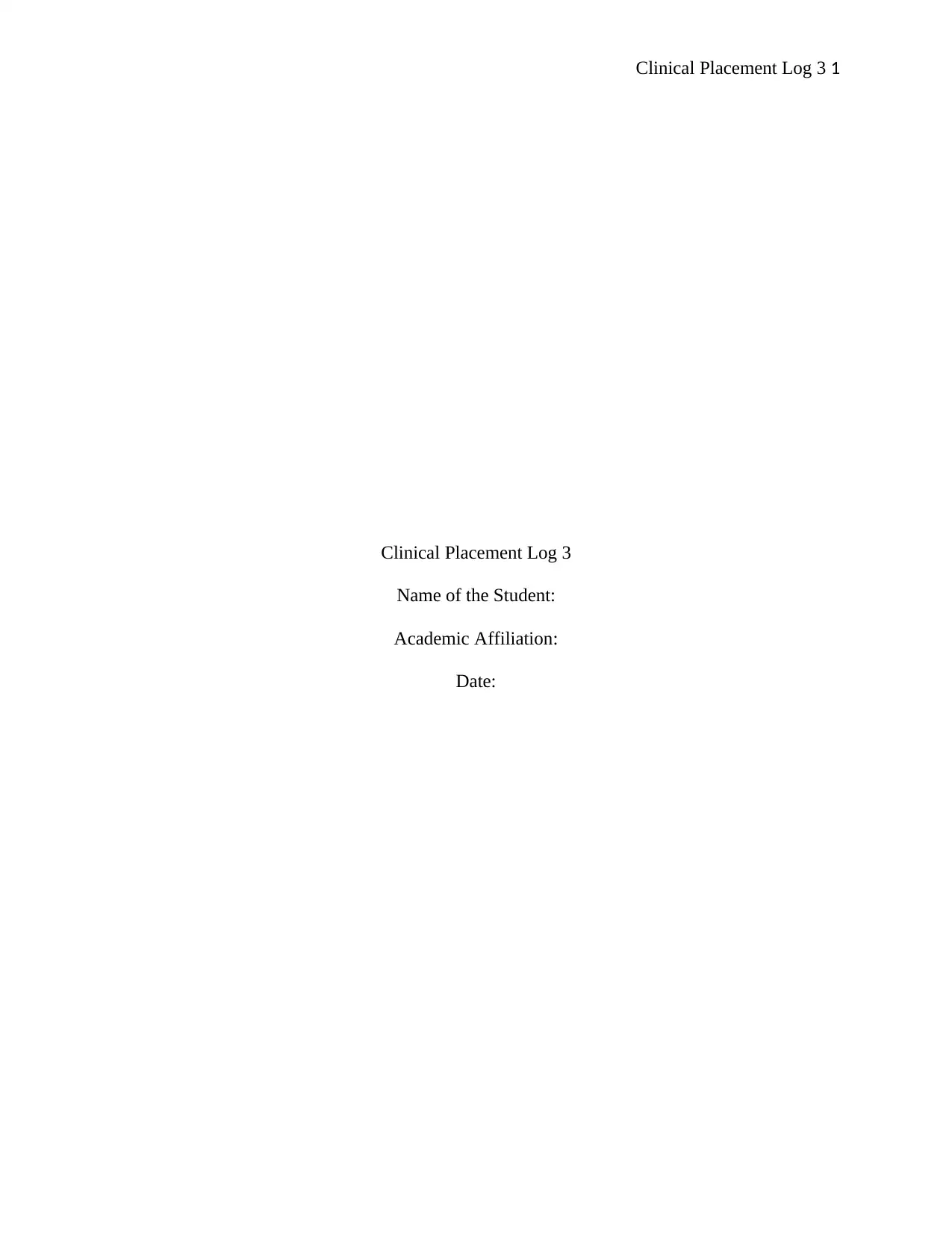
Clinical Placement Log 3 1
Clinical Placement Log 3
Name of the Student:
Academic Affiliation:
Date:
Clinical Placement Log 3
Name of the Student:
Academic Affiliation:
Date:
Paraphrase This Document
Need a fresh take? Get an instant paraphrase of this document with our AI Paraphraser
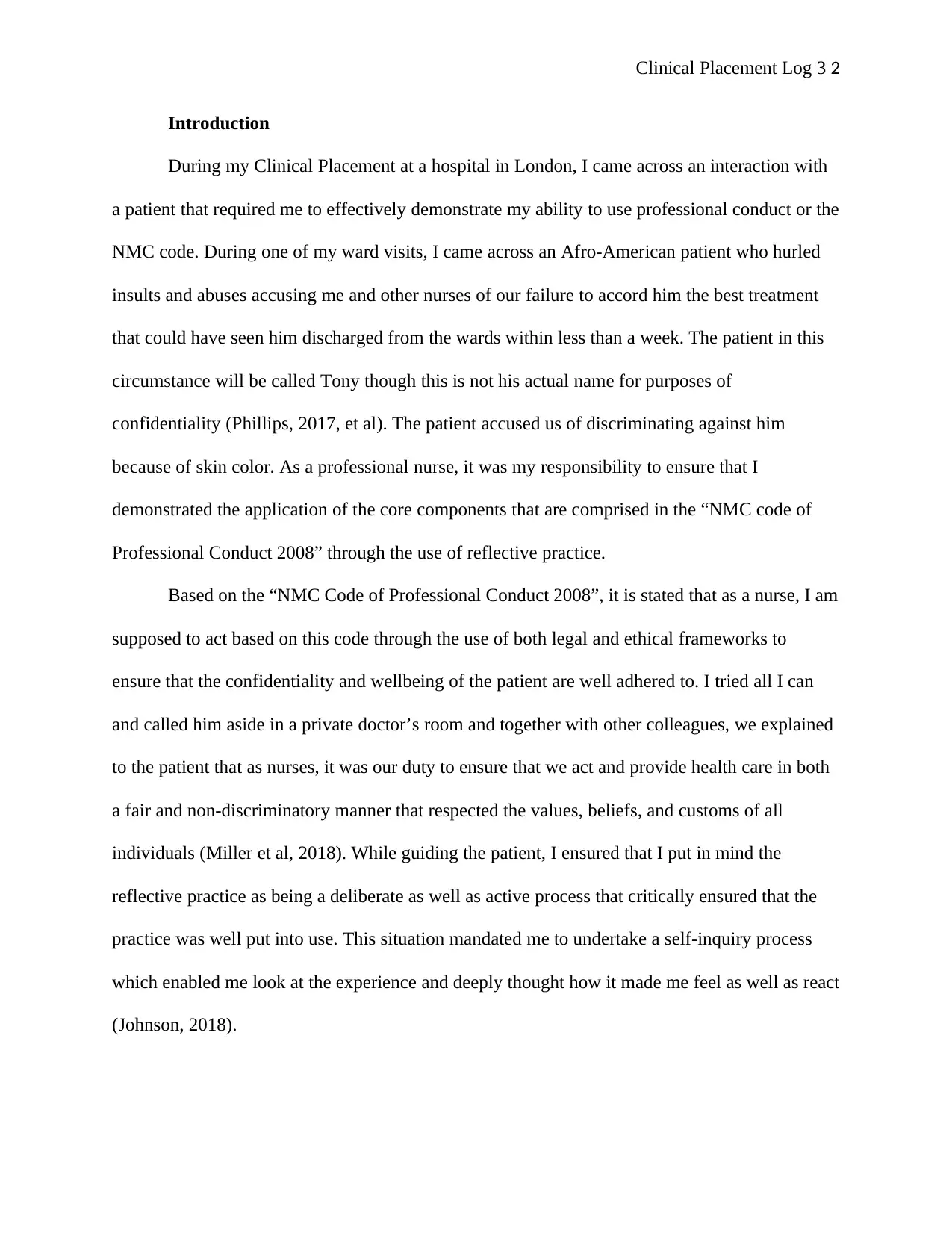
Clinical Placement Log 3 2
Introduction
During my Clinical Placement at a hospital in London, I came across an interaction with
a patient that required me to effectively demonstrate my ability to use professional conduct or the
NMC code. During one of my ward visits, I came across an Afro-American patient who hurled
insults and abuses accusing me and other nurses of our failure to accord him the best treatment
that could have seen him discharged from the wards within less than a week. The patient in this
circumstance will be called Tony though this is not his actual name for purposes of
confidentiality (Phillips, 2017, et al). The patient accused us of discriminating against him
because of skin color. As a professional nurse, it was my responsibility to ensure that I
demonstrated the application of the core components that are comprised in the “NMC code of
Professional Conduct 2008” through the use of reflective practice.
Based on the “NMC Code of Professional Conduct 2008”, it is stated that as a nurse, I am
supposed to act based on this code through the use of both legal and ethical frameworks to
ensure that the confidentiality and wellbeing of the patient are well adhered to. I tried all I can
and called him aside in a private doctor’s room and together with other colleagues, we explained
to the patient that as nurses, it was our duty to ensure that we act and provide health care in both
a fair and non-discriminatory manner that respected the values, beliefs, and customs of all
individuals (Miller et al, 2018). While guiding the patient, I ensured that I put in mind the
reflective practice as being a deliberate as well as active process that critically ensured that the
practice was well put into use. This situation mandated me to undertake a self-inquiry process
which enabled me look at the experience and deeply thought how it made me feel as well as react
(Johnson, 2018).
Introduction
During my Clinical Placement at a hospital in London, I came across an interaction with
a patient that required me to effectively demonstrate my ability to use professional conduct or the
NMC code. During one of my ward visits, I came across an Afro-American patient who hurled
insults and abuses accusing me and other nurses of our failure to accord him the best treatment
that could have seen him discharged from the wards within less than a week. The patient in this
circumstance will be called Tony though this is not his actual name for purposes of
confidentiality (Phillips, 2017, et al). The patient accused us of discriminating against him
because of skin color. As a professional nurse, it was my responsibility to ensure that I
demonstrated the application of the core components that are comprised in the “NMC code of
Professional Conduct 2008” through the use of reflective practice.
Based on the “NMC Code of Professional Conduct 2008”, it is stated that as a nurse, I am
supposed to act based on this code through the use of both legal and ethical frameworks to
ensure that the confidentiality and wellbeing of the patient are well adhered to. I tried all I can
and called him aside in a private doctor’s room and together with other colleagues, we explained
to the patient that as nurses, it was our duty to ensure that we act and provide health care in both
a fair and non-discriminatory manner that respected the values, beliefs, and customs of all
individuals (Miller et al, 2018). While guiding the patient, I ensured that I put in mind the
reflective practice as being a deliberate as well as active process that critically ensured that the
practice was well put into use. This situation mandated me to undertake a self-inquiry process
which enabled me look at the experience and deeply thought how it made me feel as well as react
(Johnson, 2018).
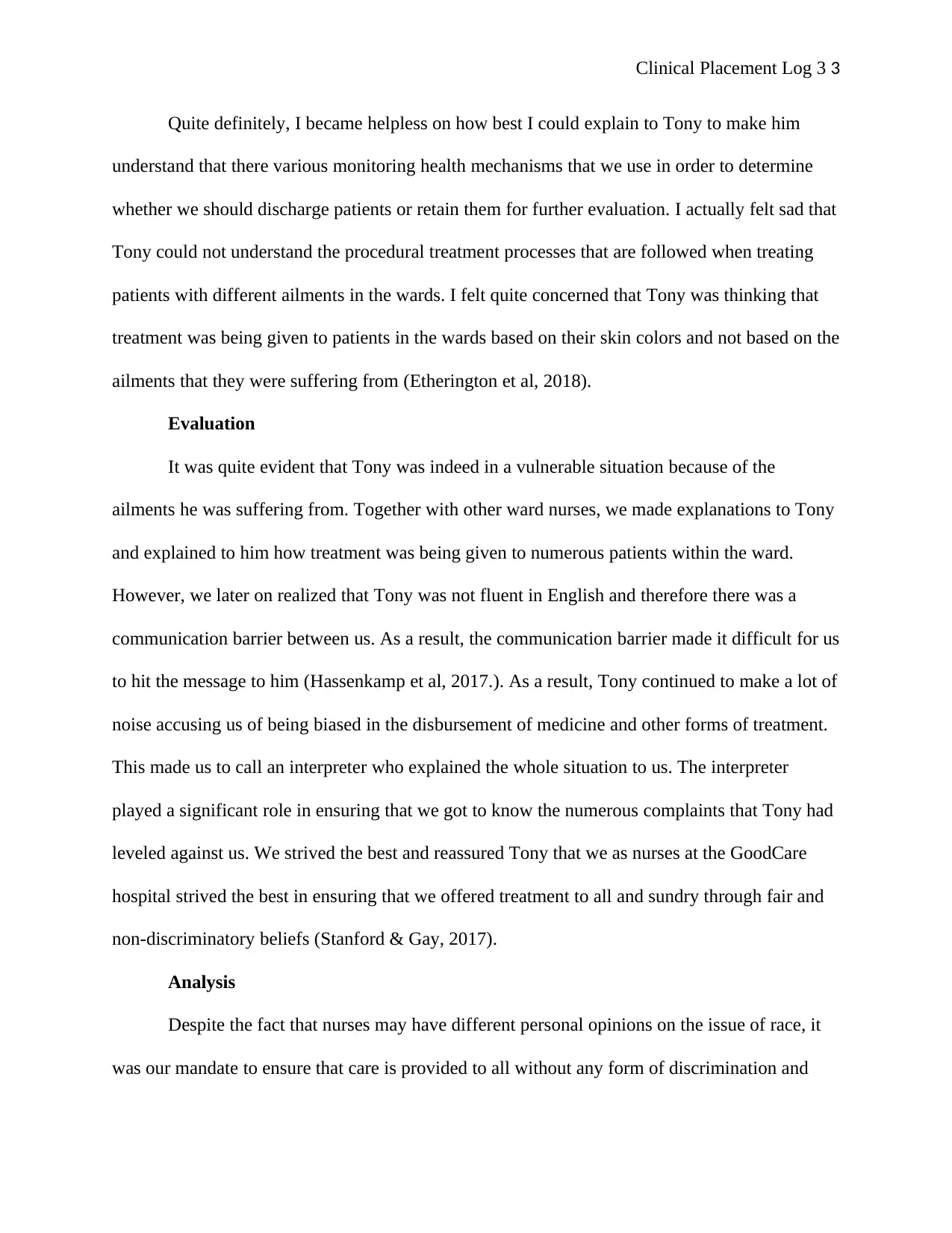
Clinical Placement Log 3 3
Quite definitely, I became helpless on how best I could explain to Tony to make him
understand that there various monitoring health mechanisms that we use in order to determine
whether we should discharge patients or retain them for further evaluation. I actually felt sad that
Tony could not understand the procedural treatment processes that are followed when treating
patients with different ailments in the wards. I felt quite concerned that Tony was thinking that
treatment was being given to patients in the wards based on their skin colors and not based on the
ailments that they were suffering from (Etherington et al, 2018).
Evaluation
It was quite evident that Tony was indeed in a vulnerable situation because of the
ailments he was suffering from. Together with other ward nurses, we made explanations to Tony
and explained to him how treatment was being given to numerous patients within the ward.
However, we later on realized that Tony was not fluent in English and therefore there was a
communication barrier between us. As a result, the communication barrier made it difficult for us
to hit the message to him (Hassenkamp et al, 2017.). As a result, Tony continued to make a lot of
noise accusing us of being biased in the disbursement of medicine and other forms of treatment.
This made us to call an interpreter who explained the whole situation to us. The interpreter
played a significant role in ensuring that we got to know the numerous complaints that Tony had
leveled against us. We strived the best and reassured Tony that we as nurses at the GoodCare
hospital strived the best in ensuring that we offered treatment to all and sundry through fair and
non-discriminatory beliefs (Stanford & Gay, 2017).
Analysis
Despite the fact that nurses may have different personal opinions on the issue of race, it
was our mandate to ensure that care is provided to all without any form of discrimination and
Quite definitely, I became helpless on how best I could explain to Tony to make him
understand that there various monitoring health mechanisms that we use in order to determine
whether we should discharge patients or retain them for further evaluation. I actually felt sad that
Tony could not understand the procedural treatment processes that are followed when treating
patients with different ailments in the wards. I felt quite concerned that Tony was thinking that
treatment was being given to patients in the wards based on their skin colors and not based on the
ailments that they were suffering from (Etherington et al, 2018).
Evaluation
It was quite evident that Tony was indeed in a vulnerable situation because of the
ailments he was suffering from. Together with other ward nurses, we made explanations to Tony
and explained to him how treatment was being given to numerous patients within the ward.
However, we later on realized that Tony was not fluent in English and therefore there was a
communication barrier between us. As a result, the communication barrier made it difficult for us
to hit the message to him (Hassenkamp et al, 2017.). As a result, Tony continued to make a lot of
noise accusing us of being biased in the disbursement of medicine and other forms of treatment.
This made us to call an interpreter who explained the whole situation to us. The interpreter
played a significant role in ensuring that we got to know the numerous complaints that Tony had
leveled against us. We strived the best and reassured Tony that we as nurses at the GoodCare
hospital strived the best in ensuring that we offered treatment to all and sundry through fair and
non-discriminatory beliefs (Stanford & Gay, 2017).
Analysis
Despite the fact that nurses may have different personal opinions on the issue of race, it
was our mandate to ensure that care is provided to all without any form of discrimination and
⊘ This is a preview!⊘
Do you want full access?
Subscribe today to unlock all pages.

Trusted by 1+ million students worldwide
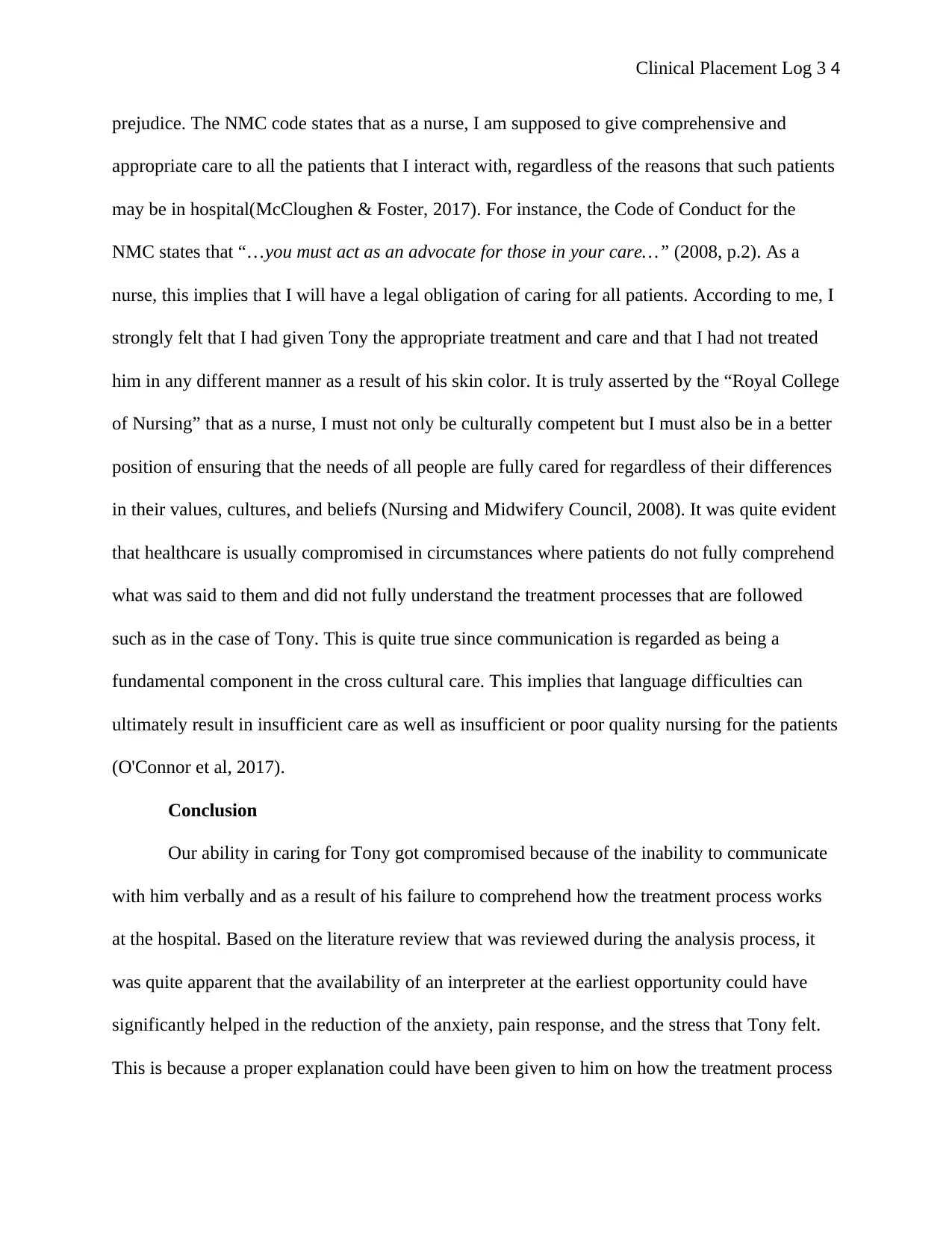
Clinical Placement Log 3 4
prejudice. The NMC code states that as a nurse, I am supposed to give comprehensive and
appropriate care to all the patients that I interact with, regardless of the reasons that such patients
may be in hospital(McCloughen & Foster, 2017). For instance, the Code of Conduct for the
NMC states that “…you must act as an advocate for those in your care…” (2008, p.2). As a
nurse, this implies that I will have a legal obligation of caring for all patients. According to me, I
strongly felt that I had given Tony the appropriate treatment and care and that I had not treated
him in any different manner as a result of his skin color. It is truly asserted by the “Royal College
of Nursing” that as a nurse, I must not only be culturally competent but I must also be in a better
position of ensuring that the needs of all people are fully cared for regardless of their differences
in their values, cultures, and beliefs (Nursing and Midwifery Council, 2008). It was quite evident
that healthcare is usually compromised in circumstances where patients do not fully comprehend
what was said to them and did not fully understand the treatment processes that are followed
such as in the case of Tony. This is quite true since communication is regarded as being a
fundamental component in the cross cultural care. This implies that language difficulties can
ultimately result in insufficient care as well as insufficient or poor quality nursing for the patients
(O'Connor et al, 2017).
Conclusion
Our ability in caring for Tony got compromised because of the inability to communicate
with him verbally and as a result of his failure to comprehend how the treatment process works
at the hospital. Based on the literature review that was reviewed during the analysis process, it
was quite apparent that the availability of an interpreter at the earliest opportunity could have
significantly helped in the reduction of the anxiety, pain response, and the stress that Tony felt.
This is because a proper explanation could have been given to him on how the treatment process
prejudice. The NMC code states that as a nurse, I am supposed to give comprehensive and
appropriate care to all the patients that I interact with, regardless of the reasons that such patients
may be in hospital(McCloughen & Foster, 2017). For instance, the Code of Conduct for the
NMC states that “…you must act as an advocate for those in your care…” (2008, p.2). As a
nurse, this implies that I will have a legal obligation of caring for all patients. According to me, I
strongly felt that I had given Tony the appropriate treatment and care and that I had not treated
him in any different manner as a result of his skin color. It is truly asserted by the “Royal College
of Nursing” that as a nurse, I must not only be culturally competent but I must also be in a better
position of ensuring that the needs of all people are fully cared for regardless of their differences
in their values, cultures, and beliefs (Nursing and Midwifery Council, 2008). It was quite evident
that healthcare is usually compromised in circumstances where patients do not fully comprehend
what was said to them and did not fully understand the treatment processes that are followed
such as in the case of Tony. This is quite true since communication is regarded as being a
fundamental component in the cross cultural care. This implies that language difficulties can
ultimately result in insufficient care as well as insufficient or poor quality nursing for the patients
(O'Connor et al, 2017).
Conclusion
Our ability in caring for Tony got compromised because of the inability to communicate
with him verbally and as a result of his failure to comprehend how the treatment process works
at the hospital. Based on the literature review that was reviewed during the analysis process, it
was quite apparent that the availability of an interpreter at the earliest opportunity could have
significantly helped in the reduction of the anxiety, pain response, and the stress that Tony felt.
This is because a proper explanation could have been given to him on how the treatment process
Paraphrase This Document
Need a fresh take? Get an instant paraphrase of this document with our AI Paraphraser
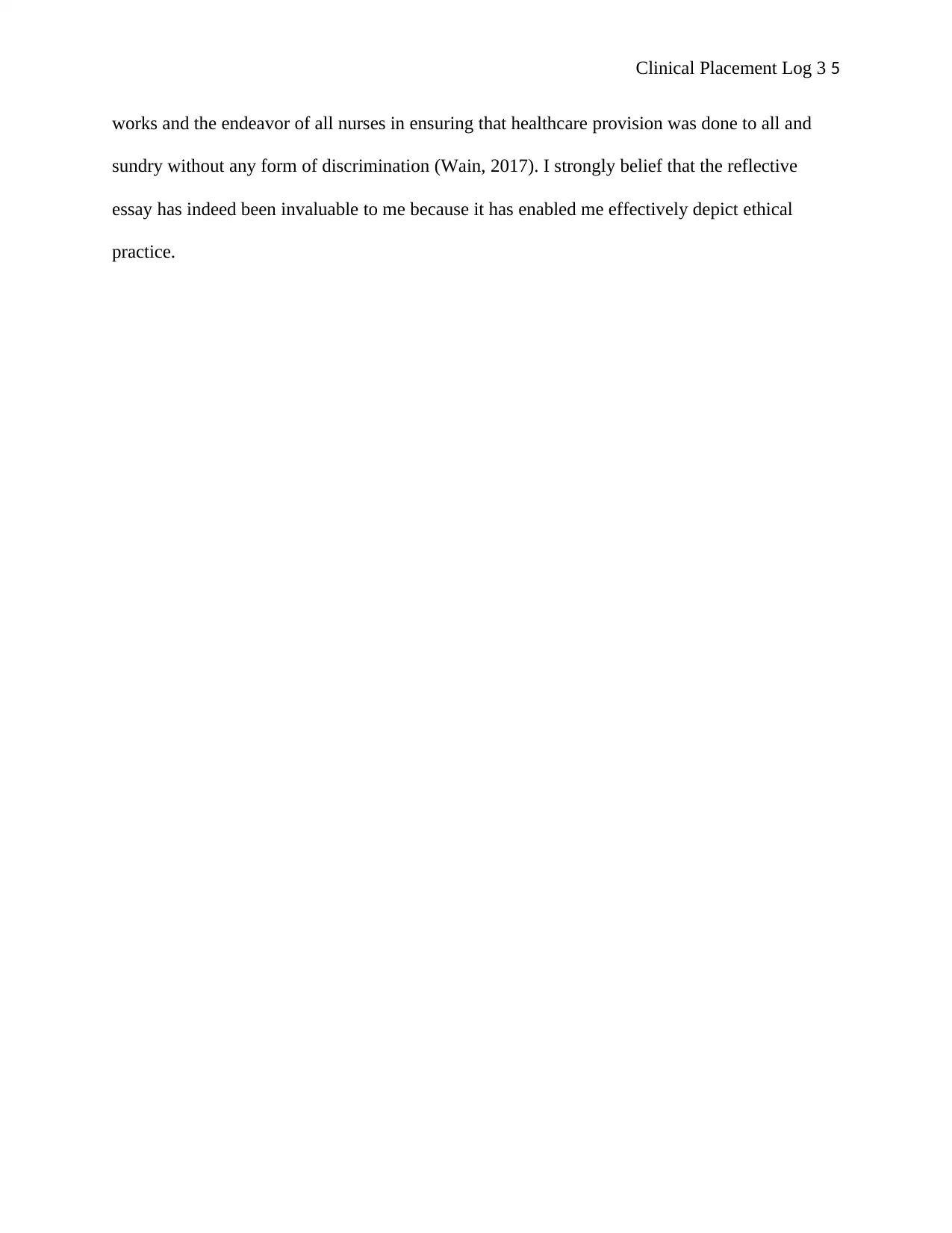
Clinical Placement Log 3 5
works and the endeavor of all nurses in ensuring that healthcare provision was done to all and
sundry without any form of discrimination (Wain, 2017). I strongly belief that the reflective
essay has indeed been invaluable to me because it has enabled me effectively depict ethical
practice.
works and the endeavor of all nurses in ensuring that healthcare provision was done to all and
sundry without any form of discrimination (Wain, 2017). I strongly belief that the reflective
essay has indeed been invaluable to me because it has enabled me effectively depict ethical
practice.
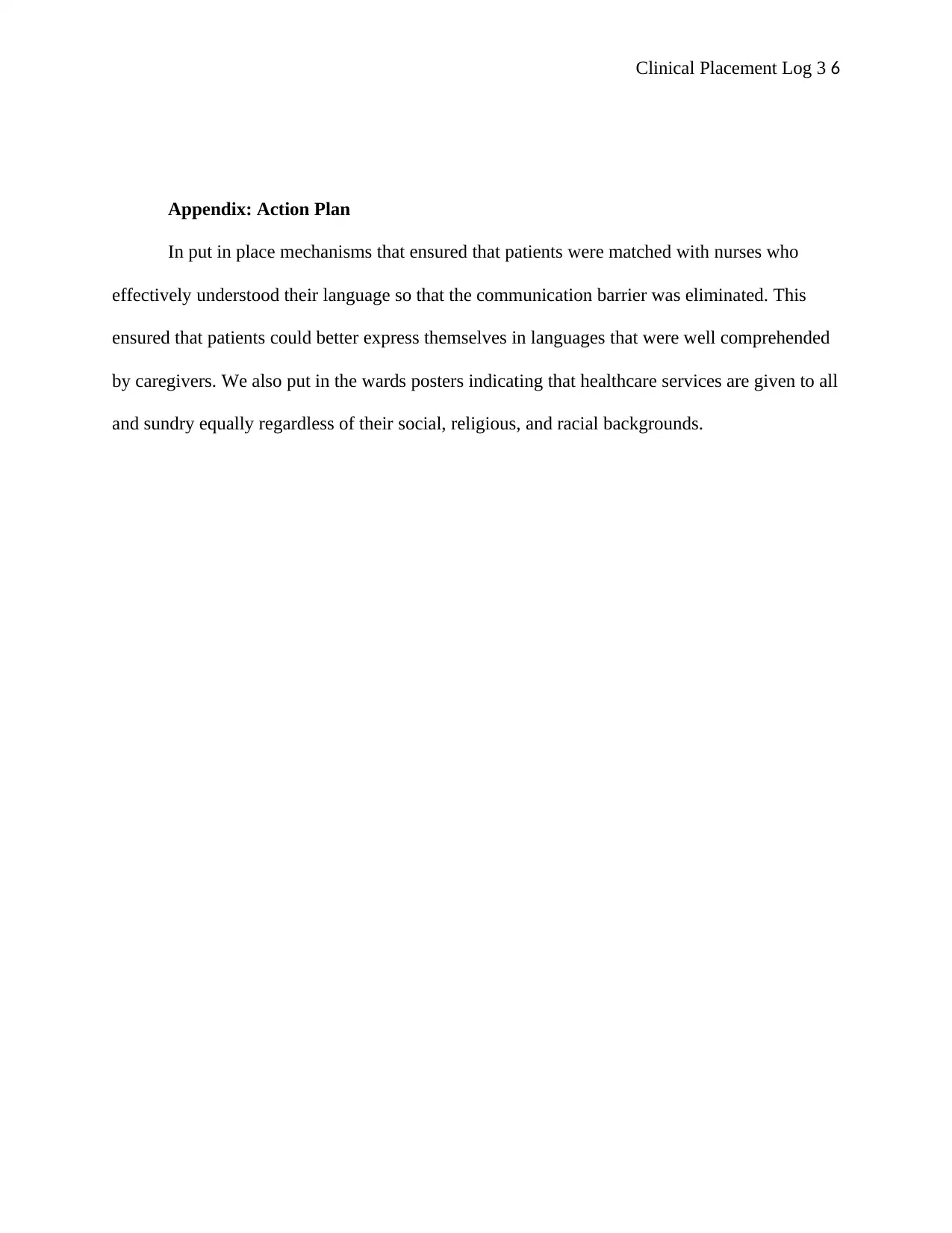
Clinical Placement Log 3 6
Appendix: Action Plan
In put in place mechanisms that ensured that patients were matched with nurses who
effectively understood their language so that the communication barrier was eliminated. This
ensured that patients could better express themselves in languages that were well comprehended
by caregivers. We also put in the wards posters indicating that healthcare services are given to all
and sundry equally regardless of their social, religious, and racial backgrounds.
Appendix: Action Plan
In put in place mechanisms that ensured that patients were matched with nurses who
effectively understood their language so that the communication barrier was eliminated. This
ensured that patients could better express themselves in languages that were well comprehended
by caregivers. We also put in the wards posters indicating that healthcare services are given to all
and sundry equally regardless of their social, religious, and racial backgrounds.
⊘ This is a preview!⊘
Do you want full access?
Subscribe today to unlock all pages.

Trusted by 1+ million students worldwide
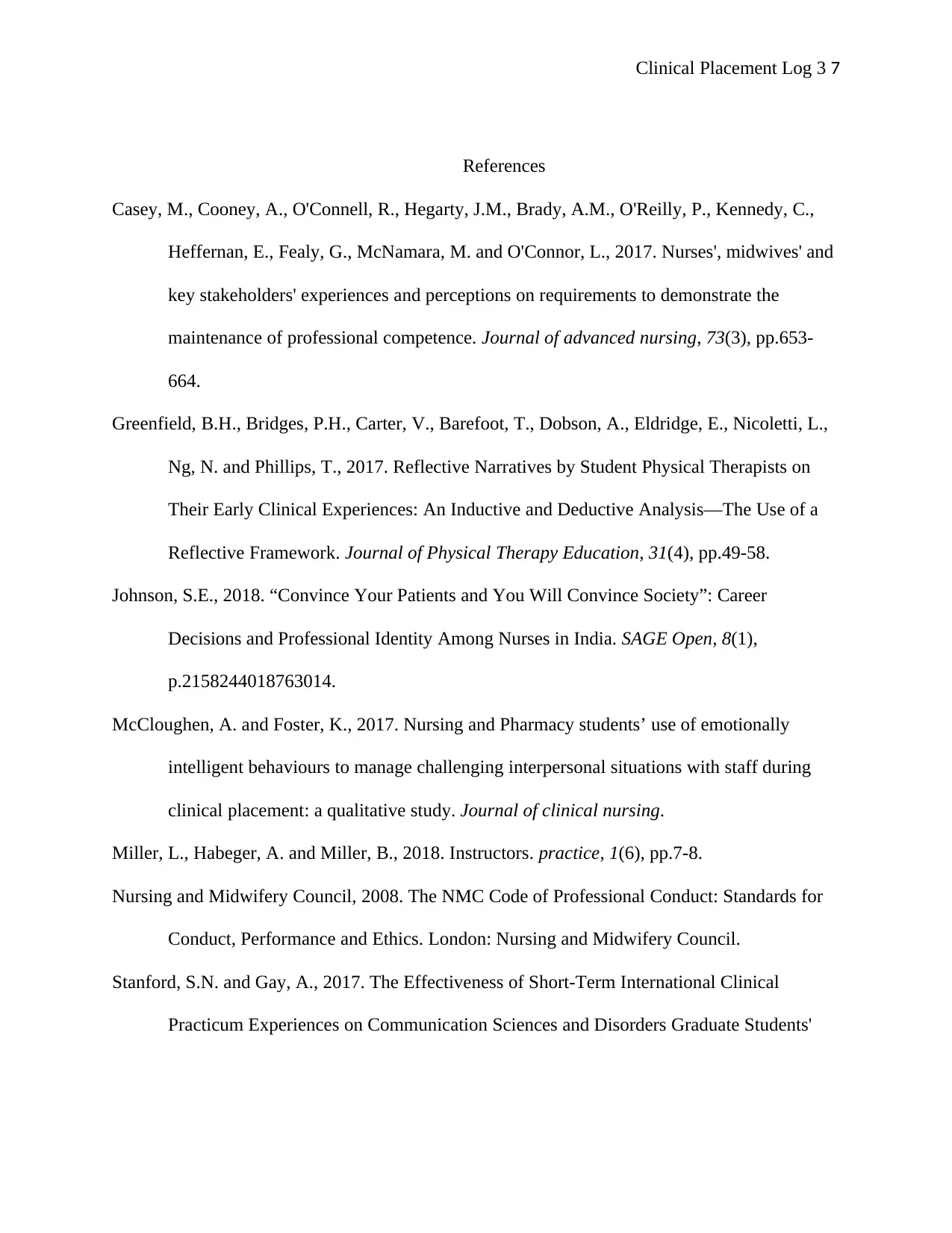
Clinical Placement Log 3 7
References
Casey, M., Cooney, A., O'Connell, R., Hegarty, J.M., Brady, A.M., O'Reilly, P., Kennedy, C.,
Heffernan, E., Fealy, G., McNamara, M. and O'Connor, L., 2017. Nurses', midwives' and
key stakeholders' experiences and perceptions on requirements to demonstrate the
maintenance of professional competence. Journal of advanced nursing, 73(3), pp.653-
664.
Greenfield, B.H., Bridges, P.H., Carter, V., Barefoot, T., Dobson, A., Eldridge, E., Nicoletti, L.,
Ng, N. and Phillips, T., 2017. Reflective Narratives by Student Physical Therapists on
Their Early Clinical Experiences: An Inductive and Deductive Analysis—The Use of a
Reflective Framework. Journal of Physical Therapy Education, 31(4), pp.49-58.
Johnson, S.E., 2018. “Convince Your Patients and You Will Convince Society”: Career
Decisions and Professional Identity Among Nurses in India. SAGE Open, 8(1),
p.2158244018763014.
McCloughen, A. and Foster, K., 2017. Nursing and Pharmacy students’ use of emotionally
intelligent behaviours to manage challenging interpersonal situations with staff during
clinical placement: a qualitative study. Journal of clinical nursing.
Miller, L., Habeger, A. and Miller, B., 2018. Instructors. practice, 1(6), pp.7-8.
Nursing and Midwifery Council, 2008. The NMC Code of Professional Conduct: Standards for
Conduct, Performance and Ethics. London: Nursing and Midwifery Council.
Stanford, S.N. and Gay, A., 2017. The Effectiveness of Short-Term International Clinical
Practicum Experiences on Communication Sciences and Disorders Graduate Students'
References
Casey, M., Cooney, A., O'Connell, R., Hegarty, J.M., Brady, A.M., O'Reilly, P., Kennedy, C.,
Heffernan, E., Fealy, G., McNamara, M. and O'Connor, L., 2017. Nurses', midwives' and
key stakeholders' experiences and perceptions on requirements to demonstrate the
maintenance of professional competence. Journal of advanced nursing, 73(3), pp.653-
664.
Greenfield, B.H., Bridges, P.H., Carter, V., Barefoot, T., Dobson, A., Eldridge, E., Nicoletti, L.,
Ng, N. and Phillips, T., 2017. Reflective Narratives by Student Physical Therapists on
Their Early Clinical Experiences: An Inductive and Deductive Analysis—The Use of a
Reflective Framework. Journal of Physical Therapy Education, 31(4), pp.49-58.
Johnson, S.E., 2018. “Convince Your Patients and You Will Convince Society”: Career
Decisions and Professional Identity Among Nurses in India. SAGE Open, 8(1),
p.2158244018763014.
McCloughen, A. and Foster, K., 2017. Nursing and Pharmacy students’ use of emotionally
intelligent behaviours to manage challenging interpersonal situations with staff during
clinical placement: a qualitative study. Journal of clinical nursing.
Miller, L., Habeger, A. and Miller, B., 2018. Instructors. practice, 1(6), pp.7-8.
Nursing and Midwifery Council, 2008. The NMC Code of Professional Conduct: Standards for
Conduct, Performance and Ethics. London: Nursing and Midwifery Council.
Stanford, S.N. and Gay, A., 2017. The Effectiveness of Short-Term International Clinical
Practicum Experiences on Communication Sciences and Disorders Graduate Students'
Paraphrase This Document
Need a fresh take? Get an instant paraphrase of this document with our AI Paraphraser
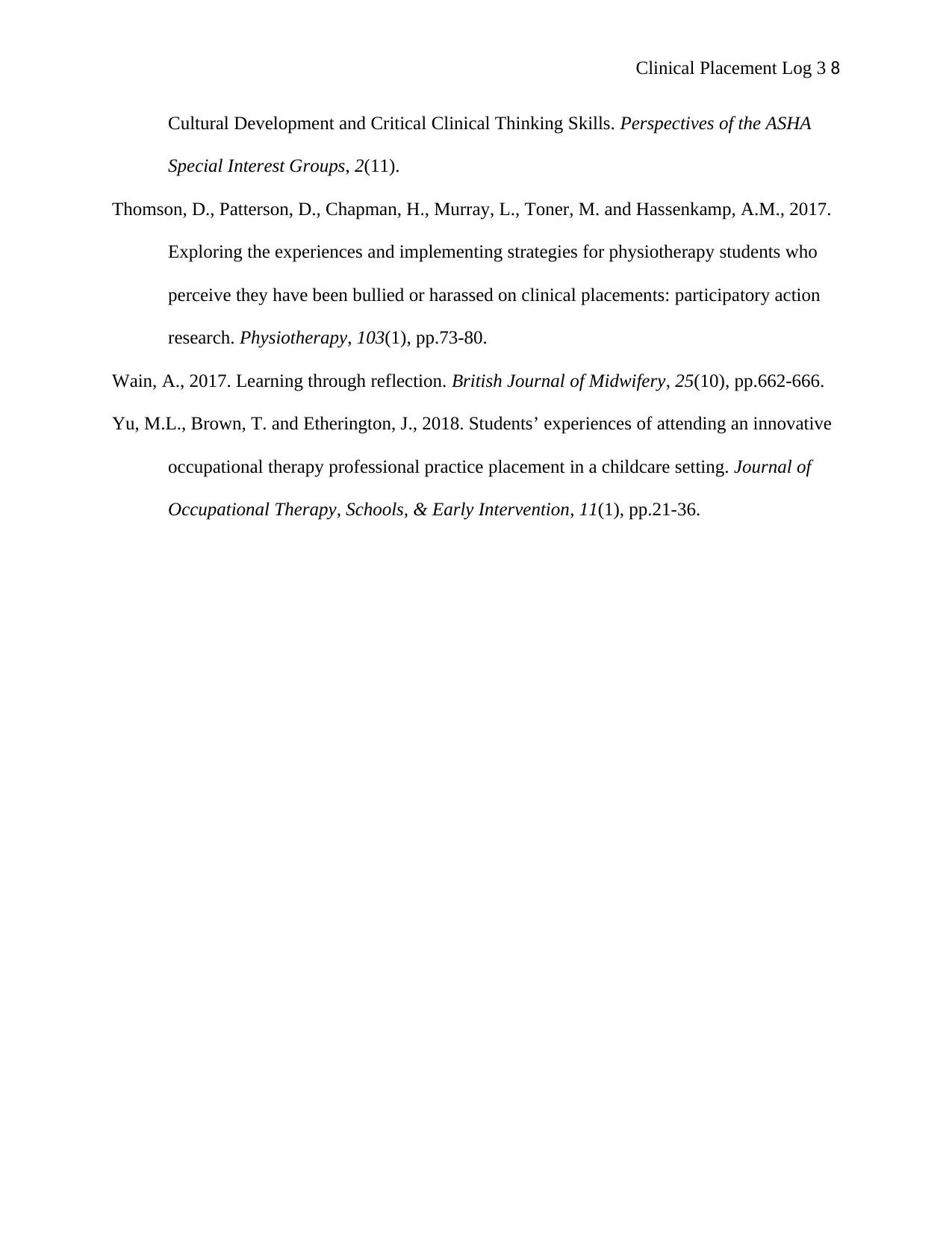
Clinical Placement Log 3 8
Cultural Development and Critical Clinical Thinking Skills. Perspectives of the ASHA
Special Interest Groups, 2(11).
Thomson, D., Patterson, D., Chapman, H., Murray, L., Toner, M. and Hassenkamp, A.M., 2017.
Exploring the experiences and implementing strategies for physiotherapy students who
perceive they have been bullied or harassed on clinical placements: participatory action
research. Physiotherapy, 103(1), pp.73-80.
Wain, A., 2017. Learning through reflection. British Journal of Midwifery, 25(10), pp.662-666.
Yu, M.L., Brown, T. and Etherington, J., 2018. Students’ experiences of attending an innovative
occupational therapy professional practice placement in a childcare setting. Journal of
Occupational Therapy, Schools, & Early Intervention, 11(1), pp.21-36.
Cultural Development and Critical Clinical Thinking Skills. Perspectives of the ASHA
Special Interest Groups, 2(11).
Thomson, D., Patterson, D., Chapman, H., Murray, L., Toner, M. and Hassenkamp, A.M., 2017.
Exploring the experiences and implementing strategies for physiotherapy students who
perceive they have been bullied or harassed on clinical placements: participatory action
research. Physiotherapy, 103(1), pp.73-80.
Wain, A., 2017. Learning through reflection. British Journal of Midwifery, 25(10), pp.662-666.
Yu, M.L., Brown, T. and Etherington, J., 2018. Students’ experiences of attending an innovative
occupational therapy professional practice placement in a childcare setting. Journal of
Occupational Therapy, Schools, & Early Intervention, 11(1), pp.21-36.
1 out of 8
Related Documents
Your All-in-One AI-Powered Toolkit for Academic Success.
+13062052269
info@desklib.com
Available 24*7 on WhatsApp / Email
![[object Object]](/_next/static/media/star-bottom.7253800d.svg)
Unlock your academic potential
Copyright © 2020–2026 A2Z Services. All Rights Reserved. Developed and managed by ZUCOL.



